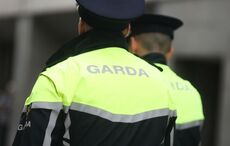UPDATE: Ireland's Minister for Justice Frances Fitzgerald announced on April 1 that Harry Gleeson, who was wrongfully convicted of murder and hanged 74 years ago, will receive an official pardon from the Irish government.
“The Government deeply regrets that a man was convicted and executed in circumstances now found to be unsafe. All that can be done now by way of remedy is to clear his name of the conviction, which this pardon will do, in the hope that this will be a proper tribute to his memory,” read a statement from the Department of Justice.
“Equally the Government regrets that this decision leaves unresolved the brutal murder of Ms Mary McCarthy, whose children were deprived of their mother in terrible circumstances.”
President Michael D. Higgins will be able to issue a pardon, as outlined by Article 13.6 of the Irish Constitution.
Read the full, sad story of Harry Gleeson and Mary McCarthy below:
In late November of 1941, a Co. Tipperary farmhand who was well-known and loved in his village of New Inn was prosecuted and hanged for a murder he had no part in.
Early one morning Henry "Harry" Gleeson found his neighbor Mary “Moll” McCarthy, a mother of seven with a local reputation for promiscuity, dead in a field on his uncle John Caesar’s farm. She had suffered two grisly shotgun wounds to the face and neck. He alerted local gardai (police), and was hanged five months later.
Now, almost three-quarters of a century later, Gleeson is receiving Ireland’s first posthumous pardon. A corrupt and unjust prosecution ended his life 74 years ago – since then, lawyers, students, investigators and medical examiners have worked toward clearing his name.
Mary “Moll” McCarthy, nicknamed “Foxy Moll” for her red hair, lived in a hovel with her seven children beside the 75-acre farm where Gleeson and Caesar made a living. She survived on a government handout of less than 50 cents and two pints of milk per day for her children, who had been born from different fathers. She drew her water from a well on Caesar’s farm.
A social outcast in her Catholic society, Moll was called “the devil’s disciple” by a local parish priest. She was hated especially by the local women, as many of their husbands had fathered Moll’s children. A couple of years before her death, someone had set the thatched roof of her cottage aflame, for which she received $23 from the government for “malicious damage.”
Though Gleeson’s wrongful prosecution was laden with cover ups, intimidated witnesses, general incompetence, and deliberate mishandling of (already insufficient) evidence, he made for an easy scapegoat; rumor had it that Gleeson was the father of Moll’s seventh child who’d died three weeks after birth. If John Caesar found out, they suspected, Gleeson wouldn’t inherit the farm.
Today it is believed that a local garda sergeant was the child’s father. He visited Moll the day before she died, and he was known to have been involved with her sexually.
The Irish Innocence Project based out of Dublin’s Griffith College, as well as the Justice for Harry Gleeson group, have come forth with a dramatic development in proof of his innocence, the Irish Times said.
They submitted their joint research to Ireland’s Department of Justice, which revealed 74 years after the fact that the prosecution encouraged witnesses to falsify statements, one witness was severely beaten, vital information was withheld, and Gleeson’s alibi was ignored.
Many discrepancies were highlighted, like questions about the firearm register for example, which was not produced during the trial despite the judge having asked for it. The firearm register did surface in recent decades and shows clear signs of being tampered with.
A pathologist also verified with forensic evidence that Gleeson did indeed have an alibi, and additionally, when one of Moll’s daughters was hospitalized fifty years later, she had said to a nurse: “I saw my own mother shot on the kitchen floor, and an innocent man died.”
Garda complicity and a paramilitary connection are some possibilities of why Gleeson was framed for this murder.
One of twelve children, Gleeson was born in 1903 in Holycross, Co. Tipperary. He moved to New Inn during his adolescence to help his uncle run the farm. According to the Irish Times he was a good hurler and fiddle player, and had an interest in greyhounds.
Gleeson fervently denied ever having an “immoral association” with Moll and insisted he had no "hand, act or part" in her murder. After his conviction, Gleeson’s junior council Sean MacBride appealed “on the ground that the charge to the jury had been ‘incomplete, defective, unsatisfactory and incorrect.’”
MacBride was so convinced there had been a miscarriage of justice that it led him to start the campaign for the abolition of capital punishment.
On the night before his execution, Gleeson told MacBride, “The last thing I want to say is that I will pray tomorrow that whoever did it will be discovered, and that the whole thing will be like an open book. I rely on you, then, to clear my name. I have no confession to make, only that I didn't do it."
Notes that MacBride had written about their meeting were later found in his car; they described how calm Gleeson was regarding his execution. He considered himself prepared for death.
The notes read: “He asked me to let his uncle and aunt and his friends know that he did not mind at all dying, as he was well prepared, and that he would pray for them as soon as he reached heaven.
“He was quite calm and happy. He assured me several times that he would not like to change places with anyone else, as he felt sure that he had undergone his purgatory in this world and that he might never have such an opportunity of being so well prepared to meet his death."
On the next day his executioner, an Englishman named Pierrepoint, took Gleeson’s life.
“Nothing can adequately comfort those who have fought to exonerate Harry Gleeson but this posthumous pardon and the clearing of the good name of Mr Gleeson is a proud moment for everyone involved,” David Langwallner, Dean of Law at Griffith College and Irish Innocence Project director said in the aftermath of their recent success.
“This case was a tragic miscarriage of justice, and the hanging of Mr. Gleeson for a murder he never committed is a dark stain on the memory of the State,” said Professor Diarmuid Hegarty, president of Griffith College.
“However his posthumous pardon shows that justice is not blind to injustice.”
The Irish Innocence Project currently has 21 students from Griffith College, Trinity College and Dublin City University working on 25 cases under the supervision of eight lawyers working pro-bono.
A book called “Murder at Marhill. Was Harry Gleeson Innocent?” by Marcus Bourke was published in 1993, and it essentially cleared Gleeson’s name. Marcus considered the question mark unnecessary, but the publishers exercised caution.
The look into Gleeson’s life and past proves him to have been a deeply moral and devout man. Moll was seen as an immoral woman, but a good mother to her children.
Bourke wrote that Moll was a "victim of a perverted sense of morality bred by a civilization which, nominally based on Christianity," lacked most of its essentials.
"Through the conspiracy of silence which prevented Harry Gleeson's lawyers from mounting an adequate defense on his behalf, that same perversion made him a second victim of the unchristian civilization," he said.
*Initial article published January 13, 2015. Update published April 3, 2015.




Comments